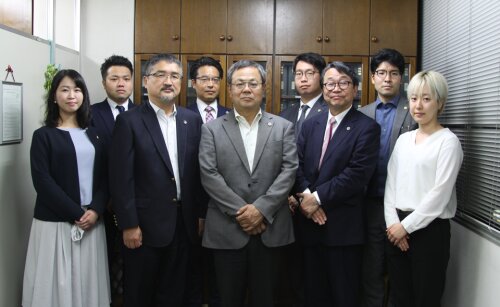Best Employment & Labor Lawyers in Shizuoka
Share your needs with us, get contacted by law firms.
Free. Takes 2 min.
List of the best lawyers in Shizuoka, Japan
About Employment & Labor Law in Shizuoka, Japan
This guide explains key points about employment and labor law as they apply in Shizuoka Prefecture, Japan. Employment matters in Japan are governed by national laws that set minimum standards for wages, working hours, paid leave, workplace safety, dismissal procedures, and anti-discrimination. Local authorities and institutions in Shizuoka administer and enforce those laws, offer consultation services, and assist with dispute resolution. Whether you are an employee, an employer, or a foreign worker, knowing your rights and the local procedures in Shizuoka can help you respond effectively when a workplace problem arises.
Why You May Need a Lawyer
Employment and labor disputes can be legally and emotionally complex. You may need a lawyer when:
- You suspect wrongful or unfair dismissal and want to challenge the termination.
- Your employer has not paid wages, overtime, bonuses, or unpaid leave owed to you.
- You face workplace harassment, sexual harassment, or discrimination on grounds such as gender, nationality, age, or disability.
- You have been injured at work and need help with compensation or industrial accident claims.
- Your employment contract contains unclear, overly broad, or potentially unlawful clauses such as restrictive covenants or penalty clauses.
- You are involved in collective bargaining, union-organizing disputes, or unfair labor practice allegations.
- You are a foreign worker with visa-related employment issues, contract breaches, or exploitation concerns.
- You need help negotiating severance, restructuring terms, or voluntary resignation packages.
Lawyers with employment law experience can advise on legal strategy, represent you at mediations or hearings, draft and review agreements, and file lawsuits if necessary.
Local Laws Overview
Key legal frameworks and local institutions relevant in Shizuoka include:
- National statutes: The Labor Standards Act, Labor Contracts Act, Industrial Safety and Health Act, Equal Employment Opportunity Act, and related laws set the baseline rights and obligations for employers and employees across Japan.
- Working hours and overtime: Standard statutory working hours are commonly 8 hours per day and 40 hours per week. Overtime and late-night work require premium pay under the Labor Standards Act and may require an overtime agreement between employer and employees.
- Minimum wage: Minimum wages are set at the prefectural level and reviewed annually. Employers must pay at least the Shizuoka minimum wage applicable at the time of work.
- Paid leave and other leave rights: Employees generally earn paid annual leave after a qualifying period of employment. The exact entitlement increases with length of service. Special leaves such as maternity, childcare, and family-care leave are also protected.
- Dismissal rules: Employers must have objectively reasonable grounds and follow socially acceptable procedures to dismiss employees. Summary dismissal or dismissal without adequate cause can be challenged as unfair dismissal.
- Workplace safety and industrial accidents: Employers have legal duties to maintain safe workplaces. Industrial accident compensation and procedures are administered through local labor and health authorities.
- Anti-discrimination and harassment: There are protections against sexual harassment and some forms of discrimination at work. Employers are obligated to prevent and address harassment.
- Local institutions: The Shizuoka Labour Bureau, local Labor Standards Inspection Offices, Hello Work employment centers, and the Shizuoka Bar Association provide consultations, enforcement, mediation, and referral services. Trade unions and labor consultative services can also assist employees and employers locally.
Frequently Asked Questions
What should I do first if my employer does not pay my wages or overtime?
Start by documenting the problem. Keep payslips, time records, employment contract, and any communication about hours or pay. Raise the issue with your employer in writing and ask for an explanation and remedy. If that fails, seek advice from the Labor Standards Inspection Office or a lawyer experienced in labor law. Administrative guidance or mediation may resolve the dispute without litigation.
Can my employer dismiss me without notice?
Generally, employers must give 30 days notice or pay in lieu of notice for ordinary dismissals. More importantly, dismissals must be based on objectively reasonable grounds and follow socially acceptable procedures. Summary or sudden dismissals for minor reasons may be invalid and challengeable as unfair dismissal. Seek prompt advice because time limits apply.
Am I entitled to severance pay if I am laid off?
There is no general statutory right to severance pay in Japan. Whether you receive severance depends on your employment contract, company rules, or negotiated agreements. However, if a dismissal is unfair, you may be entitled to reinstatement or compensation. A lawyer can assess whether severance or other remedies should apply in your case.
How long do I have to file a claim for unpaid wages or other employment violations?
There are time limits for bringing different types of claims. Many labor-related wage claims must be raised promptly, and administrative or legal options often have short deadlines. Because limits vary by claim type, act quickly and consult the Labor Standards Inspection Office, a legal aid center, or an employment lawyer to confirm applicable deadlines.
What protections exist against workplace harassment and discrimination?
Employers are required to prevent and remedy harassment, including sexual harassment and power harassment. If you experience harassment, report it through your company procedures and keep records. If the employer fails to act, you can seek assistance from labor authorities, a trade union, or a lawyer to pursue administrative remedies, mediation, or litigation.
How are working hours and overtime calculated and enforced?
Working hours are set by law and by any work rules or agreements applicable at your workplace. Employers must keep accurate work-time records. Overtime requires premium pay, and many employers must have a written overtime agreement with employees or their representatives. If you suspect unpaid overtime, gather timesheets and payslips and consult the Labor Standards Inspection Office or a lawyer.
I am a foreign worker - what special issues should I consider?
Foreign workers should ensure their employment complies with visa conditions and Japanese labor law. Watch for unlawful fee deductions, false job descriptions, or restrictions tied to immigration status. Language barriers can complicate negotiations. Seek assistance from the Shizuoka labor consultation services that offer support for foreign workers, and consider consulting an attorney who handles immigration and labor issues jointly.
Can I sign away my rights in an employment contract?
Employment contracts cannot override mandatory statutory protections. Clauses that effectively eliminate minimum statutory rights or constitute unfair penalty clauses may be invalid. Non-disclosure or confidentiality clauses are common but must be reasonable in scope. If you are unsure about contract terms, have them reviewed before signing.
What alternatives to court exist for resolving employment disputes?
Many disputes can be addressed through administrative mediation at the Labor Standards Inspection Office, conciliation at public labor offices, or voluntary mediation services. Trade unions can negotiate or bring complaints on your behalf. Mediation is often faster and less formal than court litigation. A lawyer can advise on the best route depending on the facts.
How do I find a lawyer who handles employment and labor cases in Shizuoka?
Look for attorneys with experience in labor law and a track record of handling employment disputes. You can contact the local bar association for referrals, ask for recommendations from unions, or use public legal support services for an initial consultation. When meeting a lawyer, ask about their experience, likely approach, estimated timeline, and fee structure.
Additional Resources
Useful resources and local bodies in Shizuoka to contact or consult for employment and labor matters include:
- Shizuoka Labour Bureau and local Labor Standards Inspection Offices - for enforcement of labor standards and wage claims.
- Hello Work employment service centers - for employment-related consultations and support.
- Shizuoka Prefectural government labor or employment division - for local policy information and guidance.
- Shizuoka Bar Association - for lawyer referral services and information on attorneys who handle labor cases.
- Japan Legal Support Center - for information on legal aid, low-cost consultations, and public legal assistance.
- Local trade unions and labor consultation centers - for collective support and representation options.
- Industrial accident consultation offices - for workplace injury claims and compensation advice.
Next Steps
If you need legal assistance with an employment or labor issue in Shizuoka, consider the following steps:
1. Document everything - Collect employment contracts, payslips, time records, personnel rules, emails, messages, medical certificates, and notes of conversations. Detailed records strengthen your case.
2. Use free or low-cost consultation options - Contact the Labor Standards Inspection Office, Hello Work, or a labor consultation service for an initial assessment.
3. Contact a lawyer early - If the issue involves possible dismissal, unpaid wages, harassment, or industrial injury, consult a lawyer experienced in labor law to discuss options, deadlines, and likely outcomes.
4. Prepare for discussions or negotiations - With legal advice, prepare a clear summary of facts, desired outcomes, and a list of documents to support your position.
5. Consider dispute resolution options - Mediation, administrative procedures, or negotiation may resolve the issue without litigation. If necessary, your lawyer can guide you through court proceedings.
6. Check for language or visa issues - If you are a foreign worker, confirm how employment issues interact with your immigration status and seek bilingual or specialized legal help if needed.
Act promptly when an employment problem arises. Early action, clear documentation, and appropriate legal or administrative help increase the chances of a satisfactory resolution.
Lawzana helps you find the best lawyers and law firms in Shizuoka through a curated and pre-screened list of qualified legal professionals. Our platform offers rankings and detailed profiles of attorneys and law firms, allowing you to compare based on practice areas, including Employment & Labor, experience, and client feedback.
Each profile includes a description of the firm's areas of practice, client reviews, team members and partners, year of establishment, spoken languages, office locations, contact information, social media presence, and any published articles or resources. Most firms on our platform speak English and are experienced in both local and international legal matters.
Get a quote from top-rated law firms in Shizuoka, Japan — quickly, securely, and without unnecessary hassle.
Disclaimer:
The information provided on this page is for general informational purposes only and does not constitute legal advice. While we strive to ensure the accuracy and relevance of the content, legal information may change over time, and interpretations of the law can vary. You should always consult with a qualified legal professional for advice specific to your situation.
We disclaim all liability for actions taken or not taken based on the content of this page. If you believe any information is incorrect or outdated, please contact us, and we will review and update it where appropriate.
Browse employment & labor law firms by service in Shizuoka, Japan
Shizuoka, Japan Attorneys in related practice areas.










